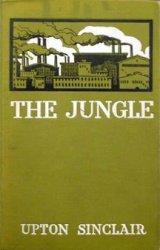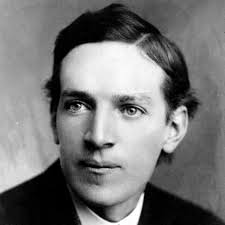The Jungle Page #28
The Jungle is a 1906 novel by the American journalist and novelist Upton Sinclair. Sinclair wrote the novel to portray the harsh conditions and exploited lives of immigrants in the United States in Chicago and similar industrialized cities.
There was no heat upon the killing beds; the men might exactly as well have worked out of doors all winter. For that matter, there was very little heat anywhere in the building, except in the cooking rooms and such places--and it was the men who worked in these who ran the most risk of all, because whenever they had to pass to another room they had to go through ice-cold corridors, and sometimes with nothing on above the waist except a sleeveless undershirt. On the killing beds you were apt to be covered with blood, and it would freeze solid; if you leaned against a pillar, you would freeze to that, and if you put your hand upon the blade of your knife, you would run a chance of leaving your skin on it. The men would tie up their feet in newspapers and old sacks, and these would be soaked in blood and frozen, and then soaked again, and so on, until by nighttime a man would be walking on great lumps the size of the feet of an elephant. Now and then, when the bosses were not looking, you would see them plunging their feet and ankles into the steaming hot carcass of the steer, or darting across the room to the hot-water jets. The cruelest thing of all was that nearly all of them--all of those who used knives--were unable to wear gloves, and their arms would be white with frost and their hands would grow numb, and then of course there would be accidents. Also the air would be full of steam, from the hot water and the hot blood, so that you could not see five feet before you; and then, with men rushing about at the speed they kept up on the killing beds, and all with butcher knives, like razors, in their hands--well, it was to be counted as a wonder that there were not more men slaughtered than cattle. And yet all this inconvenience they might have put up with, if only it had not been for one thing--if only there had been some place where they might eat. Jurgis had either to eat his dinner amid the stench in which he had worked, or else to rush, as did all his companions, to any one of the hundreds of liquor stores which stretched out their arms to him. To the west of the yards ran Ashland Avenue, and here was an unbroken line of saloons--“Whiskey Row,” they called it; to the north was Forty-seventh Street, where there were half a dozen to the block, and at the angle of the two was “Whiskey Point,” a space of fifteen or twenty acres, and containing one glue factory and about two hundred saloons. One might walk among these and take his choice: “Hot pea-soup and boiled cabbage today.” “Sauerkraut and hot frankfurters. Walk in.” “Bean soup and stewed lamb. Welcome.” All of these things were printed in many languages, as were also the names of the resorts, which were infinite in their variety and appeal. There was the “Home Circle” and the “Cosey Corner”; there were “Firesides” and “Hearthstones” and “Pleasure Palaces” and “Wonderlands” and “Dream Castles” and “Love's Delights.” Whatever else they were called, they were sure to be called “Union Headquarters,” and to hold out a welcome to workingmen; and there was always a warm stove, and a chair near it, and some friends to laugh and talk with. There was only one condition attached,--you must drink. If you went in not intending to drink, you would be put out in no time, and if you were slow about going, like as not you would get your head split open with a beer bottle in the bargain. But all of the men understood the convention and drank; they believed that by it they were getting something for nothing--for they did not need to take more than one drink, and upon the strength of it they might fill themselves up with a good hot dinner. This did not always work out in practice, however, for there was pretty sure to be a friend who would treat you, and then you would have to treat him. Then some one else would come in--and, anyhow, a few drinks were good for a man who worked hard. As he went back he did not shiver so, he had more courage for his task; the deadly brutalizing monotony of it did not afflict him so,--he had ideas while he worked, and took a more cheerful view of his circumstances. On the way home, however, the shivering was apt to come on him again; and so he would have to stop once or twice to warm up against the cruel cold. As there were hot things to eat in this saloon too, he might get home late to his supper, or he might not get home at all. And then his wife might set out to look for him, and she too would feel the cold; and perhaps she would have some of the children with her--and so a whole family would drift into drinking, as the current of a river drifts downstream. As if to complete the chain, the packers all paid their men in checks, refusing all requests to pay in coin; and where in Packingtown could a man go to have his check cashed but to a saloon, where he could pay for the favor by spending a part of the money? From all of these things Jurgis was saved because of Ona. He never would take but the one drink at noontime; and so he got the reputation of being a surly fellow, and was not quite welcome at the saloons, and had to drift about from one to another. Then at night he would go straight home, helping Ona and Stanislovas, or often putting the former on a car. And when he got home perhaps he would have to trudge several blocks, and come staggering back through the snowdrifts with a bag of coal upon his shoulder. Home was not a very attractive place--at least not this winter. They had only been able to buy one stove, and this was a small one, and proved not big enough to warm even the kitchen in the bitterest weather. This made it hard for Teta Elzbieta all day, and for the children when they could not get to school. At night they would sit huddled round this stove, while they ate their supper off their laps; and then Jurgis and Jonas would smoke a pipe, after which they would all crawl into their beds to get warm, after putting out the fire to save the coal. Then they would have some frightful experiences with the cold. They would sleep with all their clothes on, including their overcoats, and put over them all the bedding and spare clothing they owned; the children would sleep all crowded into one bed, and yet even so they could not keep warm. The outside ones would be shivering and sobbing, crawling over the others and trying to get down into the center, and causing a fight. This old house with the leaky weatherboards was a very different thing from their cabins at home, with great thick walls plastered inside and outside with mud; and the cold which came upon them was a living thing, a demon-presence in the room. They would waken in the midnight hours, when everything was black; perhaps they would hear it yelling outside, or perhaps there would be deathlike stillness--and that would be worse yet. They could feel the cold as it crept in through the cracks, reaching out for them with its icy, death-dealing fingers; and they would crouch and cower, and try to hide from it, all in vain. It would come, and it would come; a grisly thing, a specter born in the black caverns of terror; a power primeval, cosmic, shadowing the tortures of the lost souls flung out to chaos and destruction. It was cruel iron-hard; and hour after hour they would cringe in its grasp, alone, alone. There would be no one to hear them if they cried out; there would be no help, no mercy. And so on until morning--when they would go out to another day of toil, a little weaker, a little nearer to the time when it would be their turn to be shaken from the tree.
Translation
Translate and read this book in other languages:
Select another language:
- - Select -
- 简体中文 (Chinese - Simplified)
- 繁體中文 (Chinese - Traditional)
- Español (Spanish)
- Esperanto (Esperanto)
- 日本語 (Japanese)
- Português (Portuguese)
- Deutsch (German)
- العربية (Arabic)
- Français (French)
- Русский (Russian)
- ಕನ್ನಡ (Kannada)
- 한국어 (Korean)
- עברית (Hebrew)
- Gaeilge (Irish)
- Українська (Ukrainian)
- اردو (Urdu)
- Magyar (Hungarian)
- मानक हिन्दी (Hindi)
- Indonesia (Indonesian)
- Italiano (Italian)
- தமிழ் (Tamil)
- Türkçe (Turkish)
- తెలుగు (Telugu)
- ภาษาไทย (Thai)
- Tiếng Việt (Vietnamese)
- Čeština (Czech)
- Polski (Polish)
- Bahasa Indonesia (Indonesian)
- Românește (Romanian)
- Nederlands (Dutch)
- Ελληνικά (Greek)
- Latinum (Latin)
- Svenska (Swedish)
- Dansk (Danish)
- Suomi (Finnish)
- فارسی (Persian)
- ייִדיש (Yiddish)
- հայերեն (Armenian)
- Norsk (Norwegian)
- English (English)
Citation
Use the citation below to add this book to your bibliography:
Style:MLAChicagoAPA
"The Jungle Books." Literature.com. STANDS4 LLC, 2025. Web. 8 Mar. 2025. <https://www.literature.com/book/the_jungle_272>.








Discuss this The Jungle book with the community:
Report Comment
We're doing our best to make sure our content is useful, accurate and safe.
If by any chance you spot an inappropriate comment while navigating through our website please use this form to let us know, and we'll take care of it shortly.
Attachment
You need to be logged in to favorite.
Log In